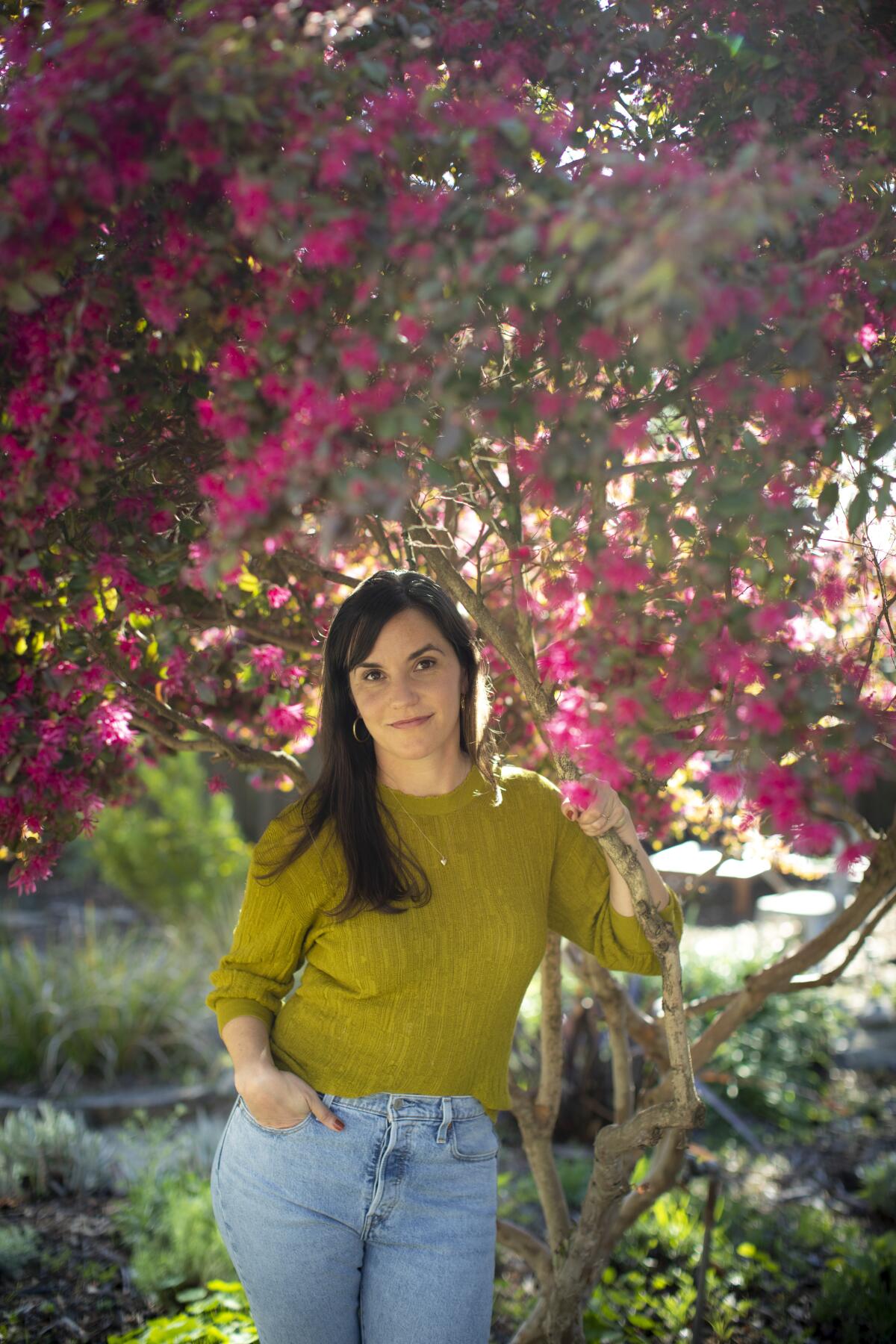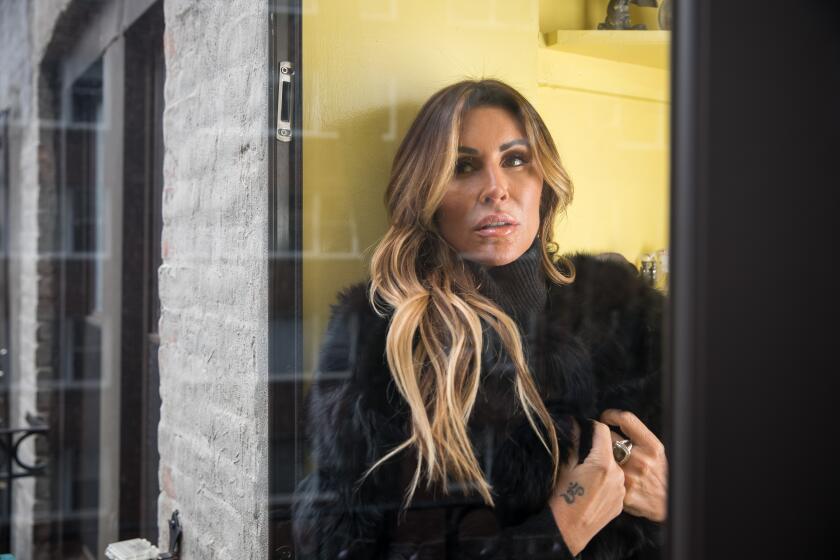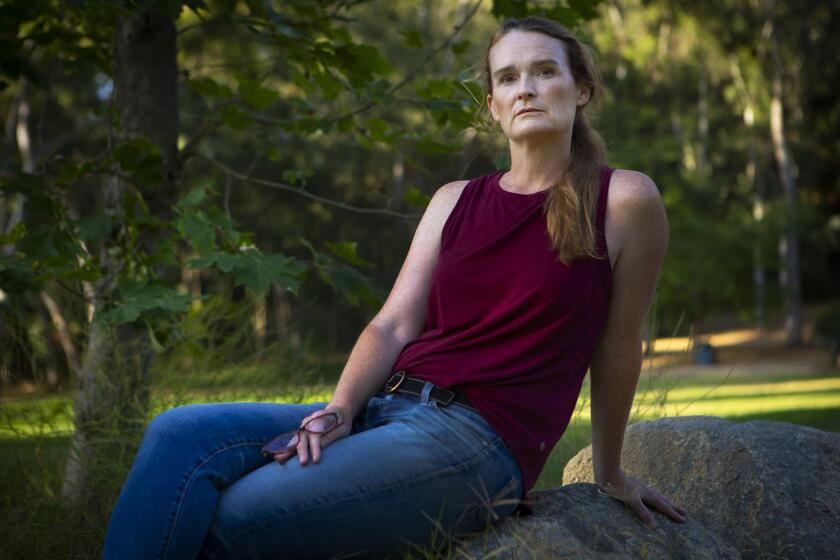A sex-positive feminist tried to ‘have sex like a man.’ It came at a cost

- Share via
When she was 15, Tracy Clark-Flory discovered her father’s pornography collection. She was using his computer and came across a website called Perfect10.com. She saw no part of her awkward teenage self reflected in the women onscreen, a collection of blonds with inflated breasts, heavy-handed blush and Barbie doll proportions.
She was horrified — not by the graphic acts depicted on the monitor but by the idea that this was what her father found attractive. Her dad: a Berkeley hippie who’d always preached, “High heels are crippling. Makeup is unnecessary. Plastic surgery is unfortunate. Shaving your legs is silly. A woman’s most attractive feature is her brain.”
After she finished crying, she printed out some of the pictures, went to her bedroom and masturbated as she imagined herself as one of the porn stars — the type of woman who could incite such desire.
It was the start of Clark-Flory’s inquiry into sexuality, a journey that would lead to jobs as a sex writer for Salon and Jezebel. Over the past 15 years, she has followed animal role players dressed in BDSM gear through the woods, answered questions about penises you were “too afraid to ask” and had a woman ejaculate on her shoe at a sexual healing workshop. But this week the 37-year-old turns the lens fully on herself in a debut memoir, “Want Me: A Sex Writer’s Journey Into the Heart of Desire.”
The book is a candid, often unflinching portrayal of a young woman coming to terms with the connection between her desirability and her self-worth. In the process, she reckons with her identity as a sexually liberated feminist who also faked orgasms with every man she was with until meeting her husband in 2007.
“I could pretty successfully cater to men’s desires and get that affirmation, but in the end, that affirmation never really felt like power,” Clark-Flory said via video call from the home she shares with her spouse and 3-year-old son, a 10-minute drive from where she grew up in the Bay Area. “I really believed that a woman’s pleasure and desire was important, but it also felt like the satisfaction that I could get from sex was from being desired. I had a hard time even identifying what it was that I wanted.”
“My Dark Vanessa” is the latest and most unsettlingly effective book in a timely genre.
Clark-Flory’s journalism — call it post-third-wave feminism — has pushed back against writers like Ariel Levy who posited that women were presenting themselves as sex objects in order to advance in a male-dominated culture. It’s not that Clark-Flory disagreed with the assessment but, as an elder millennial who came of age as Oprah Winfrey was extolling the virtues of pole dancing, she was more empathetic to the struggle.
“She grew up in a time when there was a bacchanal in your eyeballs all the time, so of course that becomes a part of who you want to be,” said Sarah Hepola, who served as Clark-Flory’s editor at Salon and wrote the sobriety memoir “Blackout.” “I think women carry around this shame, like they should be above that. But Tracy owns that contradiction. She says: ‘I know I want to be wanted.’ But that doesn’t take away from the fact that she has this intellectual life. She lets those things spark up against one another.”
If there’s a stereotypical idea of a sex writer — a flamboyant Carrie Bradshaw type who kisses and tells and relishes the attention — Clark-Flory does not fit it. At Salon, she would often show up in “cardigans buttoned all the way to the top,” said Hepola, describing her as a reserved listener who “had something in her fighting to get out.”
Despite her lack of a “performative nature,” the editor said, Clark-Flory was never embarrassed when it came to sex. “That’s one of the reasons I wanted her out talking to people,” said Hepola. “People have so much shame about their desires, and I knew when they spoke to Tracy it would release them from that.”
As “Want Me” reveals, Clark-Flory was privately using her 20s as a period to test her inhibitions. In search of some elusive state of female empowerment, she said she set out to “have sex like a man would have sex.” She wanted to be so sexually free — so “game for anything” — that nothing could be done against her will. It was, she said, a sort of self-perpetuating myth she created to reassure herself that she was in control.
“That warrior-like attitude necessarily comes with a lot of armor,” she said. “That armor comes with a lack of feeling and a sense of self-protection. And that’s not a critique of my younger self. I think that was a reasonable, adaptive response to the reality of the dating-and-sex landscape as I encountered it in my 20s. I think those were the compromises I made to be able to have sex freely in the world in which we live.”
After her mother was diagnosed with cancer, Clark-Flory asked one man to choke her so aggressively he left bruises. She even slept with her favorite male porn star, re-creating an act she’d seen him perform with women — “the ultimate representation of men’s desire” — that made her vomit. She writes that when she first met her husband, he was shocked to learn she was “just a sweet sweetie” because of the mystique she’d cultivated as “daring, irreverent sex writer.”
The sex she had prior to her marriage was all consensual. But did she enjoy it, or did she just want to enjoy it? Recalling a fleeting affair with a man she met at a New York City photo shoot during this time, she writes: “Sometimes over the years, I would think: Man, wish I could do that again. But, looking back, I’ll never shake the feeling that I was barely even there to experience it for the first time, like it was a ghost of a girl who did it all for me.”
More than a decade after her involvement with Tiger Woods, Uchitel says employers are still wary of her: “They’ve told me flat out that I’m too scandalous.”
Peggy Orenstein, the New York Times-bestselling author who explores modern sexuality in her own writing, began to pick up on these themes in Clark-Flory’s work. After reading a 2012 essay in which Clark-Flory confessed to faking her orgasms, Orenstein reached out to the young writer on Twitter. She found the piece brave, and told Clark-Flory it “echoed what I heard so often among girls — the divide between this performance of sexiness and actual embodied, pleasurable sexuality.”
“It had accelerated and been codified in a new internet era when so much is visual ... and it’s even more confusing when, simultaneously, you are supposed to have — or do have — a sense of power, voice and claim in the public realm,” said Orenstein. “On top of that, the whole idea that as a woman, what proved your desirability and your sexuality was being able to ‘take it’ — whatever ‘it’ was — male indifference, aggressive [oral sex], being slapped. ... I think Tracy is articulating how something that women have always wrestled with is being filtered through the experience of a new generation.”

One discovery Clark-Flory came to while writing “Want Me” was that she was grieving the idea that the sexual revolution had been fought and won. She’d always wanted to believe in the “girl power message” she received as a girl — that if she played her cards right, everything she wanted would come to her.
“But that isn’t true,” she said. “We’re in this space of neoliberal, individualistic, commercial feminism that really emphasizes women fixing themselves, and I think that takes us away from the collective solution. And I want to acknowledge that unfairness. To have us cut ourselves some slack and realize: It’s not you.”
St. Paul’s boarding school covered up decades of abuse. Crawford discusses her memoir, “Notes on a Silencing,” about her on-campus rape.
While Clark-Flory feels lucky to have found a loving partner — she’s been married since 2013 — there’s also a part of her that distrusts, even resents, that sense of relief. In other words: Why is the romantic landscape for women now so dire that ending up in a reciprocal, loving relationship feels like dodging a bullet?
Clark-Flory makes no secret in her book about how much of her self-image was shaped through men: “I was never alone. There was always a fantasy of some boy watching and warning me, making me better. Making me whole.”
In that sense, “Want Me” is her rallying cry for the generations of women coming up behind her.
“I wanted to write the book that I wish I had when I was a 21-year-old,” she said. “Because what I had was Laura Sessions Stepp talking about depleting your oxytocin stores if you have casual sex and Lori Gottlieb being, like, ‘Settle for Mr. Good Enough.’ I didn’t feel like I had any allies — anyone doing anything other than trying to scare me. I hope young women can take away from this that we are being told a lie about these notions of empowerment. The reality of what’s available to us, given the current state of the world, is very limited. And I hope anyone navigating this stuff can hold that broader backdrop, because I didn’t have that sense at all.”
More to Read
Sign up for our Book Club newsletter
Get the latest news, events and more from the Los Angeles Times Book Club, and help us get L.A. reading and talking.
You may occasionally receive promotional content from the Los Angeles Times.













